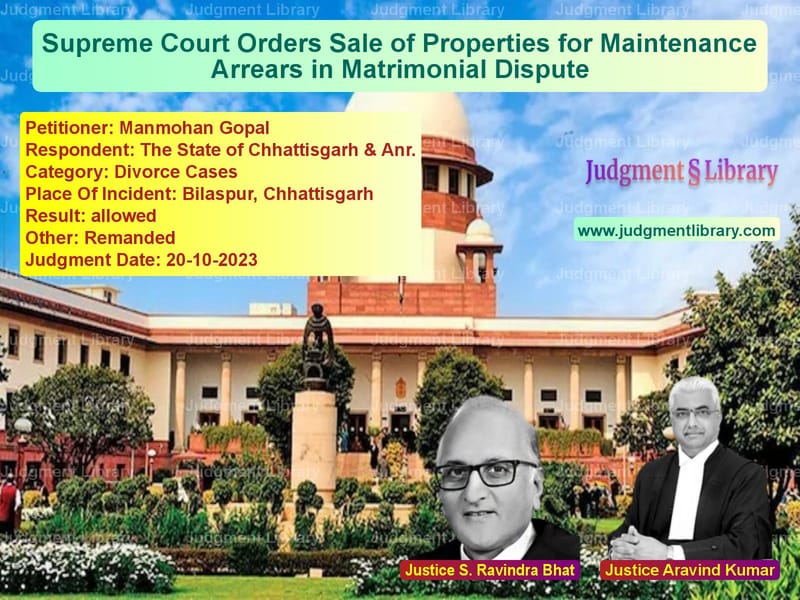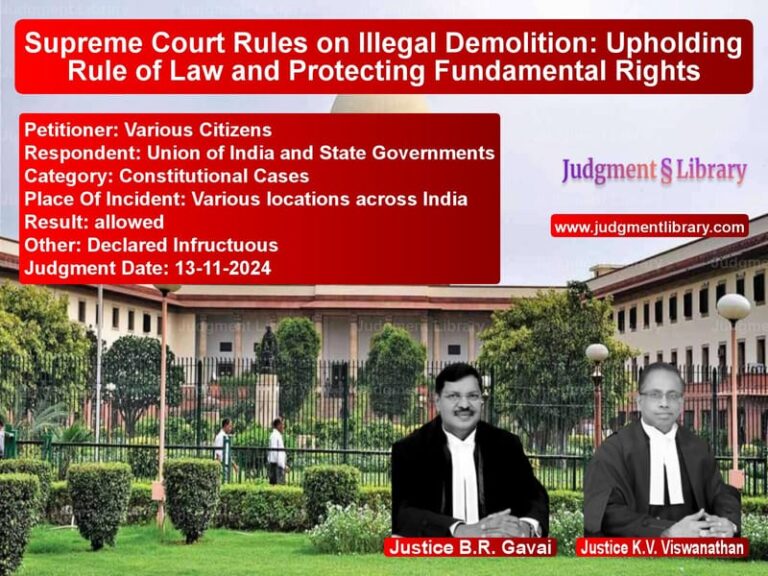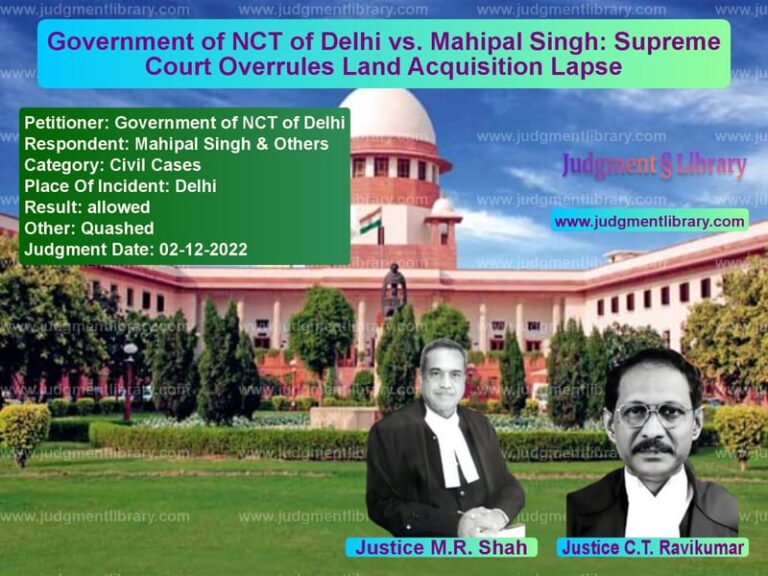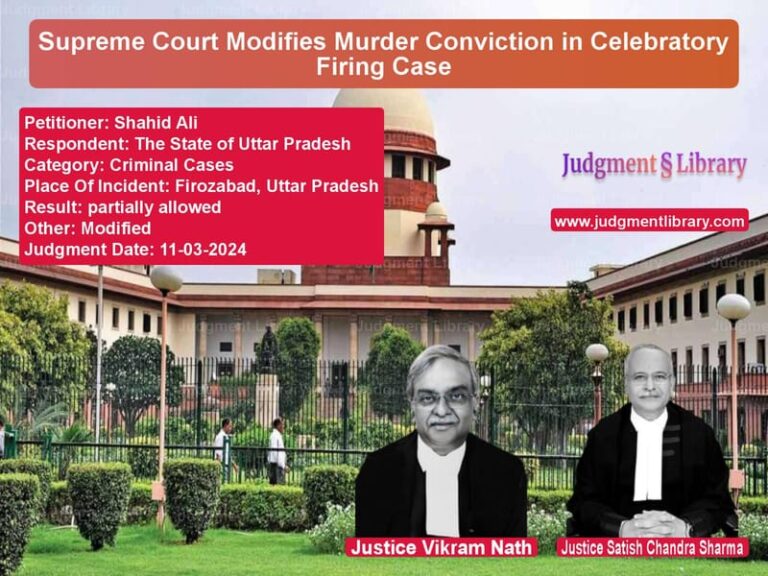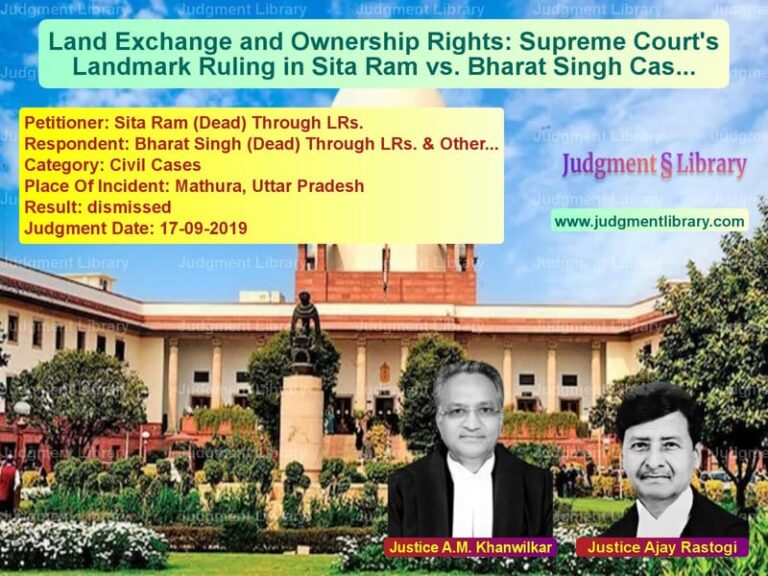Supreme Court Orders Sale of Properties for Maintenance Arrears in Matrimonial Dispute
The Supreme Court of India has delivered a crucial verdict in the case of Manmohan Gopal v. The State of Chhattisgarh & Anr., addressing long-pending maintenance arrears and enforcing legal measures to ensure financial justice for an abandoned wife. The ruling underscores the judiciary’s proactive stance in enforcing maintenance rights and sets a precedent for cases where the husband evades financial responsibilities.
Background of the Case
The case revolves around a prolonged matrimonial dispute where the petitioner’s son, Varun Gopal, married Shilpi Shrivastava in 2012-2013. Soon after marriage, the relationship deteriorated, leading to multiple legal proceedings. While facing criminal charges filed by his wife, Varun Gopal moved to Australia and failed to participate in the legal proceedings in India. His father, Manmohan Gopal, the petitioner in this case, also faced legal action for allegedly shielding his son from financial liabilities.
The courts had earlier ordered maintenance payments to the wife, which were continuously ignored by Varun Gopal and his family. Despite repeated orders, the maintenance arrears kept accumulating, reaching approximately ₹1.25 crores. Consequently, the wife filed an application seeking enforcement of the maintenance order and requested that properties owned by the petitioner and his son be sold to clear the outstanding dues.
Legal Issues
The primary legal questions before the Supreme Court included:
- Whether the petitioner (father-in-law) could be held accountable for the son’s failure to pay maintenance.
- Whether the properties in dispute, including 11 shops, could be attached and sold to clear maintenance arrears.
- Whether maintenance obligations extend beyond the husband to include ancestral and joint family properties.
Arguments by the Petitioner
The petitioner, Manmohan Gopal, opposed the attachment and sale of properties, arguing:
- That the maintenance obligations are solely upon his son, and he cannot be held responsible for his son’s debts.
- That his son had obtained a divorce decree from an Australian court, which should relieve him and his family from financial obligations.
- That the properties in question were not solely owned by his son but were part of a larger family estate.
- That his financial condition did not allow him to pay the maintenance arrears.
Arguments by the Respondent (Wife)
The wife, represented by her legal counsel, countered these claims, stating:
- That her husband had abandoned her and settled in Australia, deliberately evading legal proceedings.
- That the petitioner (father-in-law) had admitted in court that his son had a stake in the 11 shops in question, making them liable for attachment.
- That previous attempts to auction the properties had failed, necessitating alternative legal measures.
- That maintenance arrears had crossed ₹1.25 crores and urgent enforcement was required to ensure financial stability.
Supreme Court’s Observations
The Supreme Court strongly criticized the conduct of Varun Gopal and his father, stating:
“The past history of this case and the orders of this court have demonstrated the utter obduracy of Varun Gopal, who abandoned his wife and virtually fled to Australia.”
The Court emphasized that legal remedies cannot be frustrated by defiant conduct, and that it has the power under Article 142 of the Constitution to enforce justice beyond the limitations of procedural law.
On the Liability of the Father-in-Law
The Court clarified that while the primary maintenance obligation lies on the husband, in cases where the husband evades responsibility, the court can enforce financial recovery through available assets.
“The documents placed on record, including affidavits and bank statements, reveal that considerable amounts of money were remitted to Varun Gopal over a period of time. This cannot be ignored.”
On the Sale of Properties
The Court ruled that since the father had admitted to the son’s interest in the 11 shops, a portion of them must be sold to clear maintenance arrears. It directed:
- Six shops (Municipal Nos. 26, 27, 28, 29, 30, 31) to be sold under the supervision of the Registrar of the Delhi High Court.
- All rental income from attached properties to be credited to a separate account and used for maintenance payments.
- The attachment of M/s Fitness Factory Gym & Spa on the First Floor to continue until the outstanding balance is cleared.
- If the arrears remain unpaid within a year, the Registrar must initiate property transfer or auction proceedings to settle the dues.
Impact of the Judgment
This ruling establishes a strong precedent for maintenance enforcement in matrimonial disputes, ensuring that husbands cannot evade financial obligations by fleeing abroad or concealing assets. The Court’s proactive approach in ordering property sales and attaching rental income ensures that maintenance awards are not rendered meaningless due to non-compliance.
Additionally, the judgment reaffirms the judiciary’s commitment to women’s rights in matrimonial disputes, particularly in cases where husbands resort to deliberate non-payment.
Conclusion
The Supreme Court’s intervention in this case serves as a clear warning to defaulters in maintenance cases. By invoking its special powers under Article 142, the Court has ensured that justice prevails, and the petitioner is unable to use legal loopholes to avoid financial responsibilities.
With clear directives for property sales and strict enforcement measures, this judgment provides a robust mechanism for upholding maintenance laws in India.
Petitioner Name: Manmohan Gopal.Respondent Name: The State of Chhattisgarh & Anr..Judgment By: Justice S. Ravindra Bhat, Justice Aravind Kumar.Place Of Incident: Bilaspur, Chhattisgarh.Judgment Date: 20-10-2023.
Don’t miss out on the full details! Download the complete judgment in PDF format below and gain valuable insights instantly!
Download Judgment: manmohan-gopal-vs-the-state-of-chhatti-supreme-court-of-india-judgment-dated-20-10-2023.pdf
Directly Download Judgment: Directly download this Judgment
See all petitions in Alimony and Maintenance
See all petitions in Property Division in Divorce Cases
See all petitions in Dowry Cases
See all petitions in Legal Malpractice
See all petitions in Domestic Violence
See all petitions in Judgment by S Ravindra Bhat
See all petitions in Judgment by Aravind Kumar
See all petitions in allowed
See all petitions in Remanded
See all petitions in supreme court of India judgments October 2023
See all petitions in 2023 judgments
See all posts in Divorce Cases Category
See all allowed petitions in Divorce Cases Category
See all Dismissed petitions in Divorce Cases Category
See all partially allowed petitions in Divorce Cases Category

